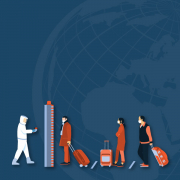COVID-19 Travel Regulations
/in Archived, News /by xp-adminPassengers entering or transiting through South Africa must have a negative Covid-19 PCR test result issued at best 72 hours preceding departure from their first embarkation point. A Traveller’s Health questionnaire must be completed upon arrival. Passengers and airline crew are also subject to medical screening.
There are visa exceptions for nationals from France, Germany, Italy, Korea (Rep), Portugal, Singapore, Spain and USA.
Angola
News published by the Angolan Government regarding travel regulations, is that no passenger is allowed in the country. This does not apply to the following:
- Angolan nationals and residents;
- Passengers with a work permit issue by Angola; and
- Passengers returning via Angola to their country of residence.
All passengers must undertake the Covid-19 RT-PCR test, at most 72 hours before departure from first embarkation point. Each passenger must have a copy of the test results document at hand, which must be either in English or Portuguese.
Passengers must complete a Travel Registration form (FVR) at most 72 hours before departure and obtain an approval to enter. Upon arrival, they will be subject to the Covid-19 rapid test and be obligated to undergo quarantine for 10 days. Airline crew members will be remitted to self-isolation until their next flight.
Angolan-issued residence permits, as well as refugee- and temporary stay visas, which expired after February 2020, will be extended until 31 July 2021.
Ethiopia
Recent information published about travelling to Ethiopia is that passengers must present a medical certificate with a negative Coronavirus (Covid-19) RT-PCR test result. The test must have been undertaken 120 hours (5 days) before arrival in the country.
This does not apply to:
- Travellers who are younger than 10 years of age;
- Holders of a diplomatic passport and their immediate family members;
- Travellers with a service passport and their immediate family members;
- Travellers with a Laissez-Passer issued by the United Nations and their immediate family members;
- E-visas that were issued before 18 June 2021 are accepted if the passenger resides in a country without an Ethiopian Embassy or Consulate;
- Ethiopian residents are allowed to enter with an expired residence permit;
- Travellers with a valid ID card or foreign nationals of Ethiopian decent can obtain a visa on arrival at Addis Ababa;
- Included are children with foreign parents of Ethiopian decent can obtain a visa on arrival at Addis Ababa; and
- Travellers with a foreign passport stating Ethiopia as a place of birth can obtain a visa on arrival at Addis Ababa.
Botswana
Information published recently advised that airports in Botswana are closed, however this does not apply to Gaborone, Francistown, Kasane and Maun. To enter through same, the following must be considered:
- Travellers must have a negative Covid-19 PCR test result that was issued, at most 72 hours before arrival and this certificate must be in English.
- This does not apply to travellers younger than 5 years.
- Travellers could be subjected to a COVID-19 test upon arrival, but at their own expense.
- Travellers could be subjected to quarantine at their own expense.
- Travellers are subject to a medical screening upon arrival.
Tanzania
In addition to the travel restrictions published on 01 July 2021, it was advised that all flights from India would be suspended. This does not apply to humanitarian, medevac or repatriation flights. Travellers are subject to a 14-day quarantine at their own expense if they are arriving from India due to humanitarian, medevac and repatriation flights.
The following is required from passengers:
- Travellers, including airline crew, must have a negative COVID-19 RT-PCR test done, at most 72 hours before arrival;
- This does not apply to a traveller younger than 5 years of age;
- Travellers arriving from Brazil, Congo (Dem. Rep), India, Indonesia, Peru, Philippines, South Africa, USA, Uganda or United Kingdom are subject to a COVID-19 Antigen test upon arrival at their own expense;
- Travellers are to complete a Traveller’s Surveillance Form, which must be presented to the Port Health Authorities upon arrival; and
Both travellers and airline crew are subject to a medical screening.





